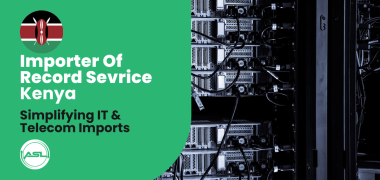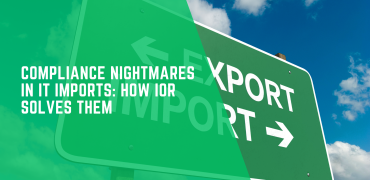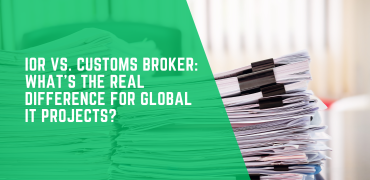Introduction
In the dynamic and rapidly evolving landscape of global trade, businesses face myriad challenges when importing goods into foreign markets. One such challenge is navigating the complex regulations and compliance requirements of the destination country. This is where the Importer of Record (IOR) service comes into play, providing a vital solution for companies looking to streamline their importation processes. In Kenya, the IOR service is especially crucial for IT and telecom companies importing high-end equipment. This article explores the concept of the IOR service, its importance, and why IT and telecom companies in Kenya should leverage this service for their import needs.
What is an Importer of Record (IOR) Service?
An Importer of Record service is a third-party service that assumes the legal responsibility for ensuring that goods imported into a country comply with local laws and regulations. This includes handling all necessary documentation, paying duties and taxes, and ensuring that the imported goods meet all regulatory requirements. The IOR acts as the official party responsible for the importation, thereby simplifying the process for businesses and ensuring compliance with local import regulations.
The Importance of IOR Service for IT and Telecom Companies
1. Regulatory Compliance
The IT and telecom industries are heavily regulated due to the nature of their equipment, which often includes sophisticated electronics and communication devices. Ensuring that these high-end products comply with Kenyan regulations is crucial to avoid legal complications and delays. An IOR service possesses the expertise and local knowledge to navigate these regulations efficiently, ensuring that all imported equipment meets the necessary standards and compliance requirements.
2. Streamlined Customs Clearance
Customs clearance is a critical step in the importation process. Delays at customs can lead to significant operational disruptions, particularly for IT and telecom companies that rely on timely delivery of equipment to maintain network infrastructure and services. An IOR service expedites the customs clearance process by handling all required paperwork, liaising with customs officials, and resolving any issues that may arise, thus ensuring smooth and timely clearance of goods.
3. Cost Efficiency
Importing high-end IT and telecom equipment can be expensive, with costs including duties, taxes, and potential fines for non-compliance. An IOR service can help manage these costs effectively by ensuring accurate classification of goods, proper documentation, and timely payment of duties and taxes. This not only minimizes the risk of fines but also helps companies budget more accurately for their import activities.
4. Risk Mitigation
The importation process is fraught with risks, including legal liabilities, compliance issues, and potential delays. Using an IOR service mitigates these risks by transferring the legal responsibilities to a knowledgeable third party. This reduces the burden on IT and telecom companies, allowing them to focus on their core operations while the IOR handles the complexities of import compliance and logistics.
5. Expertise and Local Knowledge
Kenya’s import regulations and procedures can be complex and subject to frequent changes. An IOR service brings in-depth expertise and up-to-date knowledge of local laws, ensuring that all imports are handled in accordance with the latest regulations. This local insight is invaluable for IT and telecom companies, which may lack the resources or expertise to stay abreast of regulatory changes and requirements.
Duty and Tax Structure for IT and Telecom Equipment in Kenya
1. Import Duty
The import duty on IT and telecom equipment can vary depending on the specific type of equipment being imported. The general rates are as follows:
- Computers and Laptops: Import duty is generally exempted.
- Telecom Equipment: Typically, telecom equipment falls under a duty rate of 0% to 25%, depending on the specific product classification under the East African Community (EAC) Common External Tariff (CET).
- Other IT Equipment: Items such as servers, networking equipment, and peripherals may attract different rates, usually around 0% to 25%.
2. Value Added Tax (VAT)
Value Added Tax (VAT) is levied on imported goods, including IT and telecom equipment, at a standard rate of 16%. VAT is calculated on the CIF (Cost, Insurance, and Freight) value of the goods plus any applicable import duty.
3. Railway Development Levy (RDL)
The Railway Development Levy is charged at a rate of 2% of the CIF value of the imported goods. This levy is intended to finance the development of railway infrastructure in Kenya.
4. Import Declaration Fee (IDF)
The Import Declaration Fee is charged at 3.5% of the CIF value of the goods. This fee is required for the processing of import documentation and the facilitation of customs clearance.
5. Excise Duty
Certain IT and telecom equipment may be subject to excise duty, particularly items like smartphones and certain communication devices. The rates for excise duty vary based on the specific product and are outlined in the Excise Duty Act. For example, mobile phones may attract an excise duty of 10%.
Case Study: Successful Implementation of IOR Service
Consider the case of a leading telecom company in Kenya that needed to import advanced networking equipment for a nationwide upgrade of its infrastructure. By partnering with an IOR service provider, the company was able to:
- Ensure all equipment met Kenya’s regulatory standards.
- Expedite customs clearance, reducing downtime and project delays.
- Accurately manage import costs and avoid unexpected fines.
- Focus on deployment and operational aspects, while the IOR handled import logistics and compliance.
This partnership not only streamlined the importation process but also allowed the telecom company to complete its infrastructure upgrade on schedule and within budget, highlighting the strategic value of the IOR service.
Conclusion
For IT and telecom companies in Kenya, leveraging an Importer of Record service is not just a matter of convenience but a strategic necessity. The complexities of importing high-end equipment, coupled with stringent regulatory requirements, make the IOR service an indispensable ally. By ensuring regulatory compliance, streamlining customs processes, managing costs, mitigating risks, and providing local expertise, an IOR service enables these companies to focus on their core mission: delivering cutting-edge technology and communication services to their customers. As the IT and telecom sectors continue to grow in Kenya, the importance of efficient and compliant importation practices cannot be overstated, making the IOR service a critical component of their operational strategy.




